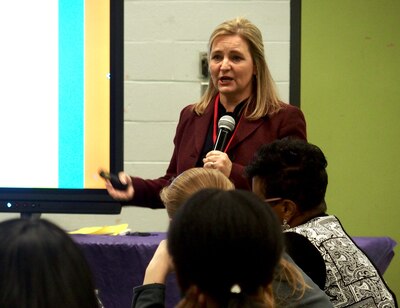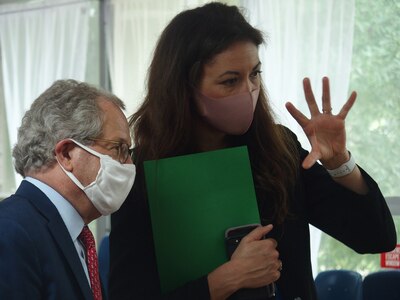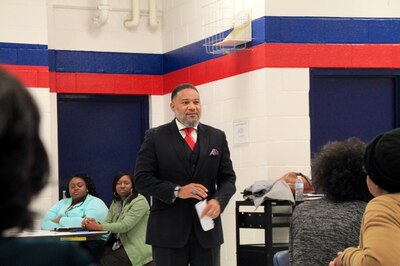Struggling Memphis and Nashville schools currently under state control won’t begin to return to their local districts until 2024 instead of 2022 as proposed earlier this year.
A group of 20 state and local education leaders began meeting in August to help the state education department craft specifics of the long-awaited transition plan for schools to exit the Achievement School District. Education Commissioner Penny Schwinn will present the plan to lawmakers in January as required by a law passed in June. That gives the department about four months to nail down the details that many education leaders in Memphis and Nashville asked for soon after the state launched the turnaround district in 2012 to take over Tennessee’s lowest-performing schools.
The ASD’s initial task was to take control of the schools, improve them within five years, and return them to their local districts. That didn’t happen. Even today, most of the early schools pulled into the ASD remain in the state’s bottom 5% academically. All but two of the 26 ASD schools are in Memphis and all but three are now run by independent charter school organizations. (Two additional schools were created to help high school students graduate.)
“The ASD was not intended to be any school’s forever home, and we still believe it should not be,” said Eve Carney, the state’s chief districts and schools officer, who is leading the advisory group and spearheading the transition plans. “As such, there is a need for a thoughtful transition plan for schools that are ready to exit.”

Among the many questions about how the district’s 9,000 students will be educated: What criteria must a charter network meet in order to continue operating the school? Would the school still serve the neighborhood — as ASD schools were designed to — or open enrollment to students across the city like other charter schools? Would teachers have to re-apply for their jobs if the local districts reject the charter operator? Would students stay in the same building, many of which have a backlog of maintenance needs, or move? All those decisions could lead to large-scale changes in leadership and classrooms.
Once those questions are answered, the state will develop criteria and a template from which ASD operators can make recommendations in partnership with their neighborhoods and local districts.
Under a proposal the department unveiled in January, the schools were to return to their local districts in 2022. But lawmakers voted in June to delay the handoff by another two years after charter and philanthropic leaders balked at a timeline they said lacked a clear plan.
“We were getting pushback saying, ‘We’ve put too much time, money, and effort into this. Now you’re going to throw us back and it’s over?’ ” explained Rep. Mark White, the Memphis Republican who co-sponsored the legislation.
The turnaround initiative, which cost the state millions of dollars, continues to have its detractors.
“Now the intervention needs an intervention,” said Rep. Antonio Parkinson, a Memphis Democrat and frequent critic of the ASD.

The coronavirus pandemic was another factor for delaying the timeline. Not only did the virus disrupt ASD schools, as it did all schools, but the subsequent economic slowdown led Gov. Bill Lee to eliminate $25 million proposed to support ASD schools in their transition.
Sticking with the 2022 exit would have created a “panic in the middle of a panic,” said Bobby White, the CEO of Frayser Community Schools, a charter network that includes three ASD schools. “It’s criminal in my mind to be talking about revocation, closures, transitions during this pandemic. We’re so challenged with having schools in this unique format,” he said.
The state plans to hold several virtual town halls in November to talk with affected communities about some of those challenges, including recommendations coming out of the advisory group. A lack of parent and community input has been a sore point from when the state began taking over schools. State officials say they’re committed to making the transition process transparent.
“For some, it was a hostile takeover,” recalls Stephanie Love, a Memphis school board member who serves on the advisory group and whose children have attended both state-run and locally run schools. “We most definitely do not want to repeat any of the mistakes the ASD made during that time. So parents should most definitely be involved.”
Gini Pupo-Walker, a Nashville school board member on the advisory group, says it’s important for the state to show that it’s learned lessons from the heavy-handed way it took over neighborhood schools in its early days.

“There’s a lot of monumental decisions to make here,” said Pupo-Walker, who also leads The Education Trust in Tennessee. “The stakes are high. A lot of kids and communities have been poorly served for many years.”
Pupo-Walker said the diverse advisory group is a good start. The list of members (which can be found at the bottom of this story) has representatives from Memphis and Nashville, including three people who have had children or grandchildren in the state-run district. Three members have ties to philanthropic organizations that have contributed money to schools in the turnaround effort. Two — Love and Angela Whitelaw — are leaders in Shelby County Schools, the district that’s due to absorb most of the ASD schools.
“Whatever impact that it will have, we are in on it from the beginning and we will be able to share with our stakeholders, with our parents, with our teachers and our principals,” said Whitelaw, deputy superintendent of schools and academic support.
Bobby White, the charter leader, noted his network has not received an evaluation from the state in three years, and the state skipped what should have been his midterm review of the organization’s 10-year contract.
Shelby County Commissioner Michael Whaley, who sits on the governmental body responsible for nearly half of funding for Shelby County Schools, said a longer runway for transitioning schools to their local districts gives leaders time to digest what the criteria will be. But “one of the challenges is that you keep kicking the can down the road and in the meantime, parents and families are left in limbo in choosing where to go to school and if it’s stable,” he said.
The state district has fallen woefully short of its goal to propel the lowest performing schools to the top 25% in the state within 5 years. Eight years later, the district’s average test scores are still below the average for Shelby County Schools, where most of the schools came from. One state school beats out the local district average in math and one school matches the district’s social studies average.

“We’re failing those kids,” said Parkinson. “This can’t possibly be what they imagined with an intervention.”
Mark White, the Republican state representative who also chairs the House Education Committee, said complaining about the state’s results is not enough.
Before the ASD, “we continued to have decade after decade of low-performing schools. It’s a shame it’s not any better in all cases. But it’s also a shame that there was no plan for decades. At least the state came up with a plan.”
Love, the Memphis school board member, agreed that more is needed than bringing the schools back under their local district.
“We have to make sure that we can provide parents a better education option,” she said. “That’s going to take funds, that’s going to take the ASD providing data and being intentional about what we want with the transition and what we need when it comes to the education.”
Members of the Achievement School District advisory group are:
- Michelle Armstrong, coordinator of instructional support at Pyramid Peak Foundation and KIPP Memphis board member
- Jay Brown, head of schools at LEAD Public Schools in Nashville
- Vinessa Brown, chairwoman of Libertas School of Memphis board of directors and co-founder of Lifeline to Success
- Maya Bugg, CEO of Tennessee Charter School Center
- Eve Carney, advisory group chairwoman and Tennessee Department of Education chief of districts and schools
- Sarah Carpenter, executive director of Memphis Lift parent advocacy group
- Victor Evans, executive director of TennesseeCAN
- Sharon Griffin, chief of innovation schools for Metro Nashville Public Schools and former superintendent of Achievement School District
- Aleah Guthrie, director of policy and government relations for SCORE and former director of policy at the Tennessee Department of Education
- State Sen. Ferrell Haile (R-Gallatin), member of Senate education committee
- Stephanie Love, Shelby County Schools board member
- Terence Patterson, CEO of Memphis Education Fund and board member of Tennessee Public Charter School Commission
- Gini Pupo-Walker, Metro Nashville Public Schools board member and Education Trust Tennessee director
- Lisa Settle, interim superintendent of the Achievement School District
- Tara Scarlett, CEO and president of Scarlett Family Foundation
- Sonia Stewart, executive officer of organizational development at Metro Nashville Public Schools
- Michael Whaley, Shelby County Commissioner
- State Rep. Mark White (R-Memphis), chair of House of Representatives education committee
- Angela Whitelaw, deputy superintendent of schools and academic support for Shelby County Schools
- Marian Williams, principal of Kirby Middle School, Green Dot Public Schools







